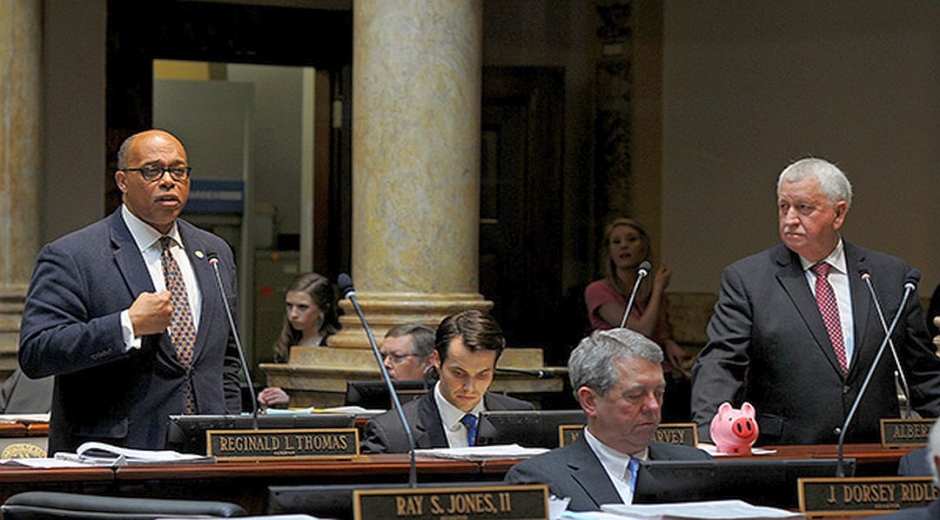
Kentucky Senate Passes Religious Freedom Bill

Thomas McAdam
iLocalNews Louisville is your best source of news and information about Derby City.
- Professional Journalist
A bill advanced in the state Senate yesterday that supporters said would protect the religious freedom of business owners but detractors warned might undermine existing civil rights laws.
Known as Senate Bill 180, the measure would protect the freedom of religion of individuals who offer customized artistic, expressive, creative, ministerial or spiritual goods and services, said Sen. Albert Robinson, R-London. It passed by a 22-16 vote.
“Shouldn’t a florist, baker and other creative artists’ First-Amendment rights of free exercise of religion be respected?” Robinson said, before quoting a section of the Kentucky Constitution that prohibits interference with “rights of conscience.”
“Yet, that is what many wish to do – to have government to force people to using their creative skills to participate in something that violates their faith conscience,” Robinson said.
He said that he introduced SB 180 in response to a Lexington custom T-shirt shop getting sued for refusing to make shirts celebrating a gay pride event.
“This bill helps to promote the time-honored principle of ‘live and let live’ and encourages a balanced environment of mutual respect and civility in our public square,” Robinson said.
Sen. Joe Bowen, R-Owensboro, said he was supporting SB 108
“I also think that each of us probably interprets the Bible in a way that is most convenient for us,” he said. “Having said that, I’m going to cling the premise that this is a ‘live and let live’ piece of legislation. In doing that, I’m going to assume it protects those we are fearful that we are discriminating against with this piece of legislation. The ‘live and let live’ premise, in my opinion, protects all parties involved.”
Sen. Brandon Smith, R-Hazard, voted for SB 180 because it was “a common sense” measure. He said everyone would be outraged if the government forced Jewish bakers to make cakes featuring Nazi symbols and minority bakers to make cakes featuring Ku Klux Klan symbols.
“Hopefully, we will have some common sense where we can rally around people we know are being unfairly treated – that are being made to do something that we know goes against who they are,” Smith said.
Sen. Reginald Thomas, D-Lexington, said he couldn’t support the bill because it would discriminate against gay people.
“That is no difference than what you say back in the 1930s when there was rampant anti-Semitism in this country or back in the 1950s and ‘60s when blacks were … demanding civil rights,” he said. “We just have to fast forward 50 years now were gays are just demanding their rightful place in our society as equal citizens. This bill is designed to prevent that, and I can’t go along with that.”
Robinson said he personally believes homosexuality and same-sex marriage are sinful, but disagreed with Thomas’ analysis that SB 180 would legalize some forms of discrimination.
“A restaurant owner could not deny service to a transgendered individual,” he said, “and a bakery could not refuse to sell pies and cookies to someone because of their sexual orientation.”
Sen. Wil Schroder, R-Wilder, said the Fayette Circuit Court ruled in favor of the Lexington T-shirt maker by finding the business was within its right not to make a T-shirt promoting gay rights. In voting against SB 108, he said the Senate should wait to see if that ruling is overturned on appeal before considering any legislation.
Sen. Julie Raque Adams, R-Louisville, said she couldn’t support SB 180, in part, because of economic concerns. She said the bill may be seen as discriminatory by businesses interested in investing in her hometown – the state’s largest city.
“I understand the need to balance competing interests in a very diverse society … but I’m concerned Senate Bill 180 goes way too far,” she said. “I’ve heard from constituents and my business community that this is just not needed.”
SB 180 now goes to the state House of Representatives for consideration.
Photo: Sen. Reginald Thomas, D-Lexington (left), debates Senate Bill 180, sponsored by Sen. Albert Robinson, R-London (right), in the Kentucky Senate. (LRC Public Information Photo)
(Robert Weber, of the Kentucky Legislative Research Commission contributed to this article)

Gideon John Tucker (February 10, 1826 – July 1899) was an American lawyer, newspaper editor and politician. In 1866, as Surrogate of New York, he wrote in a decision of a will case (Final Accounting in the Estate of A.B., 1 Tucker 248, N.Y. Surr. 1866): "No man's life, liberty or property are safe while the Legislature is in session."